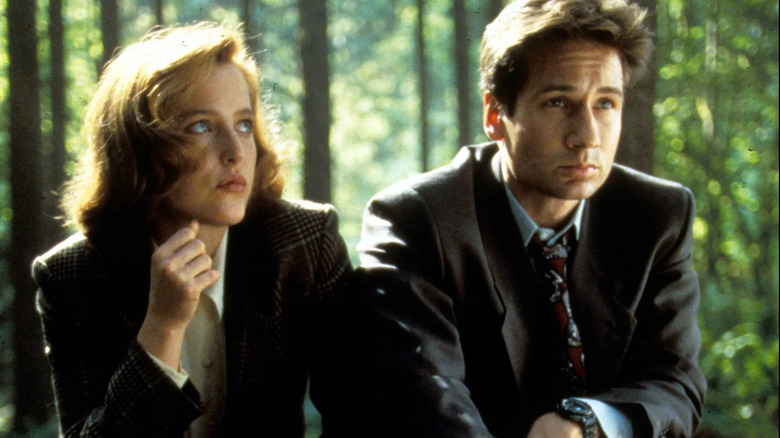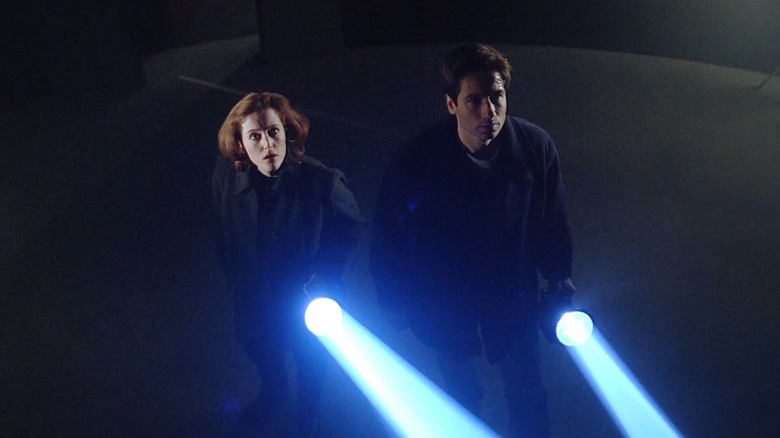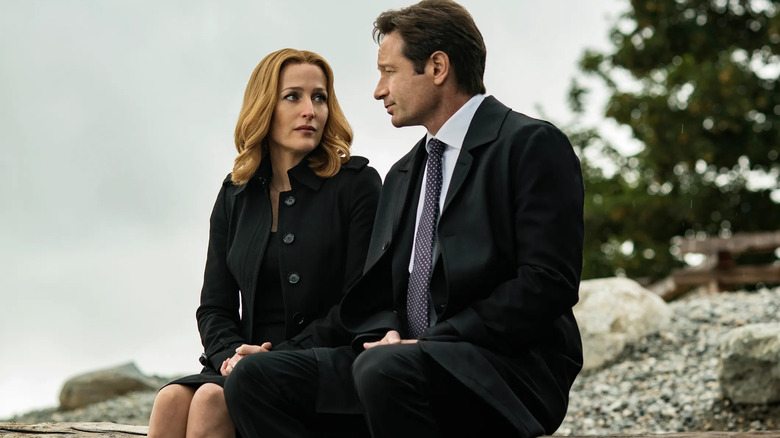Why Fox Executives Hesitated To Greenlight The X-Files
Chris Carter's 1993 TV series "The X-Files" is an undeniable staple of sci-fi television. However, it's also incredibly dated. It came out in the early years of the Bill Clinton administration, a few years after the end of the Cold War, right when Gen-X was growing up and America was experiencing something of an identity crisis. Without a war or a Great Depression to unite us, the sociological arguments went, America was culturally adrift. Having no enemies abroad to rally against, Americans began to look inward for enemies, sussing out where our violent impulses went. We found our own government to be suspect, and grew increasingly paranoid that a lot of dark information was being hidden from us.
In "The X-Files," '90s freeform paranoia manifested — perhaps curiously — as shadowy government conspiracies to cover up the existence of aliens, UFOs, and other unexplained paranormal phenomena. Only oddball FBI agents Fox Mulder (David Duchovny) and Dana Scully (Gillian Anderson, who took umbrage with one aspect of her character) had the temerity to investigate the weirdo, paranormal cases that the FBI stored in the basement. (in files under the letter "X," of course). "The X-Files" took the premise of "paranormal investigators" (previously seen in TV shows like "Kolchak: The Night Stalker") and gave it a '90s spin. the result was one of the biggest hit shows of its decade. "The X-Files" ran for nine seasons, produced two movies, and restarted in 2016 and 2018 for two "farewell" seasons.
Because corporate rock still sucks, it may be predictable that Carter had to fight to get "The X-Files" a greenlight from Fox. In 2016, the Hollywood Reporter published an oral history of "The X-Files," and Carter recalled the pushback. To be diplomatic, the oral history also included comments from Fox execs Danielle Gelber and Bob Greenblatt.
The truth is... difficult
Prior to "The X-Files," series creator Chris Carter (interviewed by /Film here) had been working in television as a writer. He had written a feature film in 1988 called "The B.R.A.T. Patrol," and wrote and directed a single episode of the series "Rags to Riches." "The X-Files" was his big break. He revealed that he was hired by Fox to pitch a new series, and Carter was in the mood for spooky science fiction. It was also during this time that Carter brushed up against the increasing popularity of alien abduction lore drifting through the American pop consciousness; many Americans began to admit to having eerie alien encounters. Carter recalled:
"I was hired by Peter Roth to develop TV shows when he moved to 20th. We were both interested in something in the vein of 'Kolchak: The Night Stalker,' and I already had an idea. It was partly inspired by the shows of my youth, 'The Twilight Zone' and 'Night Gallery,' but I had recently come upon a scientific survey done by Dr. John Mack. It said that 10 percent of Americans believed they had contact with, been abducted by or believed in extraterrestrials."
The former executive vice president of Fox's primetime programming recalls hearing Carter's Kolchak-adjacent pitch and was taken aback. Fox, he knew, wasn't seeking science fiction shows at the time. He said:
"We had a blind deal with Chris. We thought he was going to pitch a family or teenage soap, so we were surprised when he brought us high-concept science fiction. We were reluctant to develop it because we didn't have any other drama like it and weren't in the market for sci-fi."
Thanks to that blind deal, though, he and other Fox higher-ups had to consider it.
The coat-hanger network
In the 1990s, Fox was not considered a power player. They had a few hit shows like "The Simpsons" and "Married... with Children," but those were outliers on a network that was still building its brand as "the raunchy one." As such, when it came to new shows, most other artists would approach NBC first, the network with far more hit sitcoms and dramas. By the time a writer pitched their show to Fox, they had likely already been shot down by several other networks — NBC, CBS, and ABC, known as "The Big Three" — first. Danielle Gelber acknowledged that, saying:
"Fox was still being called 'the coat-hanger network' by [former NBC president] Brandon Tartikoff. We told everybody who came in the door that we knew we were the last stop on the train. 'The X-Files' was the first pitch from my first season. Chris had the most passionate, focused, dimensional, whole construct I've ever heard from anybody."
Gelber and Greenblatt didn't accept Carter's first pitch, as they required elucidation. "We were fascinated," Gelber said, "but it begged so many questions. He came back with this 15-or-20-page document that was riveting."
Carter's second, more detailed pitch was successful, and "The X-Files" was officially put into production. It became a hit, coming to both reflect and define the 1990s. Gelber loved it. "I remember reading the pilot alone in my house late at night and being terrified," she said, "chilled to the bone." That chill is well known to Gen-Xers the world over. "The X-Files" may be dated, but it has never stopped being scary.


